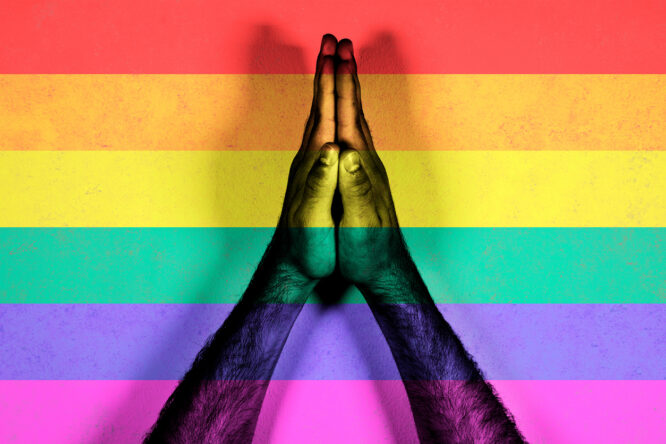Christianity, at its heart, is meant to reflect unconditional love.

It’s meant to be the kind that reaches across divides, sees the whole person, and meets people exactly where they are. Unfortunately, in practice, that message often gets tangled in rules, judgement, and selective acceptance. It’s not always the beliefs themselves that create harm—it’s how rigidly and narrowly they’re applied. These are the things many Christians still resist, despite the fact that true spiritual love should make room for all of them.
1. LGBTQ+ identities

Too often, LGBTQ+ people are only conditionally accepted—welcomed if they’re celibate, silent, or willing to change. Many churches send the message that being queer and being Christian are incompatible, no matter how strong someone’s faith might be.
However, love doesn’t ask people to shrink or erase who they are. If it’s truly unconditional, it doesn’t come with terms and conditions. Queer people deserve a seat at the table just as they are, without having to prove their worth or spiritual legitimacy.
2. Mental health struggles

People dealing with depression, anxiety, or trauma are often met with dismissal instead of care. Instead of being encouraged to ask for support, they’re told to pray more, read scripture, or trust that God will “fix” them. The implication is that mental health issues are a sign of spiritual weakness or failure.
But if love is unconditional, it doesn’t vanish when someone is struggling. It should sit with people in their darkest moments without judgement, offering companionship, not condemnation. Mental health isn’t a defect to be hidden—it’s a part of the human experience that deserves real support, not spiritual deflection.
3. Doubt

Asking hard questions, expressing uncertainty, or feeling disconnected from God is often framed as a spiritual failure. People going through doubt are urged to suppress it rather than explore it openly. Of course, doubt is part of the journey. It’s a sign of depth, not distance. Faith that can’t survive questioning is built on fear, not trust. True love allows space for complexity, not just certainty.
4. Different interpretations of scripture

When someone offers a fresh or non-traditional interpretation of the Bible, they’re often shut down quickly. It’s as if questioning a standard reading means rejecting the whole faith. However, the Bible has always been interpreted in many ways across cultures and centuries. Unconditional love means making room for discussion, not insisting one view is the only valid one. It’s about humility, not hierarchy.
5. People who leave the church
 Source: Unsplash
Source: Unsplash Whether someone leaves because of harm, changing beliefs, or life changes, they’re often labelled as lost or disloyal. Former churchgoers are gossiped about or targeted for “reconversion” instead of simply being missed and honoured for their journey. If love is unconditional, it shouldn’t disappear the moment someone walks away. It should remain steady, even in absence. People deserve to be loved for who they are, not for how closely they stick to a specific path.
6. Tattoos and body expression

There’s still judgement around tattoos, piercings, or colourful hair in many church environments. These choices are sometimes viewed as rebellious or disrespectful, regardless of their personal or cultural meaning. The thing is, outer appearance has nothing to do with inner grace. Love doesn’t hinge on modest aesthetics. It respects that people express themselves differently, and that expression is often a reflection of deep identity, not defiance.
7. Women in leadership

Some churches still bar women from preaching, teaching, or holding authority. Scripture is often used to justify it, even when the practice contradicts the gifts and leadership women clearly offer. Unconditional love doesn’t silence anyone. It uplifts and empowers. If a woman feels called to lead, her voice should be honoured, not censored under the guise of tradition.
8. Non-Christian beliefs
 Source: Unsplash
Source: Unsplash Other faiths are often dismissed as misguided, dangerous, or incomplete. Some Christians feel obligated to convert rather than connect, assuming anyone outside the church is in spiritual peril. However, love doesn’t require sameness. It can respect difference and still show up fully. Compassion across beliefs reflects spiritual maturity—not compromise. Dismissing other people entirely isn’t love—it’s superiority.
9. Divorce

Divorce still carries stigma in many Christian spaces, even when it’s the healthiest option. People are expected to stay in harmful, lonely, or even abusive marriages to avoid judgement. Love includes freedom, though. It understands that walking away can be an act of care for both people involved. Grace doesn’t vanish when relationships change; it grows to meet people where they are now.
10. Neurodivergence

People with ADHD, autism, or other neurological differences are sometimes treated as spiritually lacking because they don’t worship, learn, or connect in expected ways. They’re asked to adapt rather than the community adapting with them. Unconditional love sees past the surface. It values every mind and way of being. Neurodivergence isn’t a barrier to faith; it’s a different lens through which to experience it.
11. Non-traditional families

Families that don’t fit the nuclear mould—single parents, co-parents, chosen families—are sometimes treated as temporary, lesser, or outside the ideal. There’s an unspoken message that they’re incomplete. However, love isn’t confined to one format. It shows up in all kinds of families. The structure matters less than the presence of care, respect, and emotional safety. Every family deserves recognition, not comparison.
12. Unmarried couples

Couples who live together or choose long-term commitment without marriage are often seen as spiritually compromised. They may be excluded from leadership or viewed as less serious about their relationship. Still, love looks at intention and mutual respect, not paperwork. Marriage can be sacred, but so can other forms of commitment. A relationship built on care and integrity shouldn’t be dismissed because it doesn’t follow a script.
13. Feminism

Feminists are often portrayed as bitter, divisive, or anti-God. Challenging power dynamics can be seen as disobedience rather than advocacy for justice and equality. Newsflash: love doesn’t fear questions. It supports fairness and shared responsibility. If faith demands silence from one gender, it’s not based in love; it’s based in control.
14. People who don’t want children

Choosing not to have kids is often met with confusion or criticism, especially in Christian circles where parenting is seen as a central purpose, particularly for women. However, everyone deserves autonomy over their own life path. Love respects those choices, even when they don’t fit the expected narrative. Parenthood isn’t the only way to nurture, contribute, or live meaningfully.
15. Different cultural expressions of faith

When worship looks different—through dance, drumming, language, or rituals—it’s sometimes labelled as “unorthodox.” What’s familiar is mistaken for what’s right. But God doesn’t speak in just one cultural accent. Faith is global. Love celebrates diversity, not uniformity. There’s more than one way to be reverent.
16. Survivors of abuse who speak out

When survivors of abuse name their experiences—especially if a leader is involved—they’re often told to forgive quickly, keep quiet, or not “sow division.” Their pain is downplayed in favour of protecting the church’s image. This isn’t love—it’s erasure. True care prioritises safety, justice, and the survivor’s voice. Anything less isn’t grace. It’s complicity.
17. People who set boundaries with their families

Boundaries are sometimes treated as rebellion, especially when they’re drawn with parents or elders. The commandment to “honour your parents” is misused to justify total access, even in unhealthy relationships. Love doesn’t demand self-abandonment, however. It honours limits and the need for space. Boundaries protect connection when they’re respected—not when they’re ignored.
18. People who deconstruct their faith

When someone starts re-examining what they believe, they’re often treated as spiritually lost or misled. Deconstruction is seen as a threat, not a process of growth. But love leaves room for spiritual evolution. Questioning isn’t betrayal—it’s part of building something stronger. If a faith can’t survive re-examination, it was never unconditional to begin with.
19. People who don’t forgive on someone else’s timeline

Forgiveness is often treated like a deadline—something to rush for the sake of peacekeeping. People who take time to heal are labelled as bitter, angry, or unspiritual. True forgiveness is a personal journey. Love doesn’t pressure or force it—it waits, supports, and trusts people to move at their own pace. Healing isn’t linear, and that’s okay.
20. People who are visibly different

If someone dresses differently, worships quietly, or stands out in any way, they’re sometimes met with suspicion. Churches can become spaces of conformity, not belonging. The thing is, love is not conditional on appearance or familiarity. It opens its arms to difference and look for connection beyond surface impressions. Because if love isn’t wide enough to include everyone, it isn’t the kind God teaches at all.




